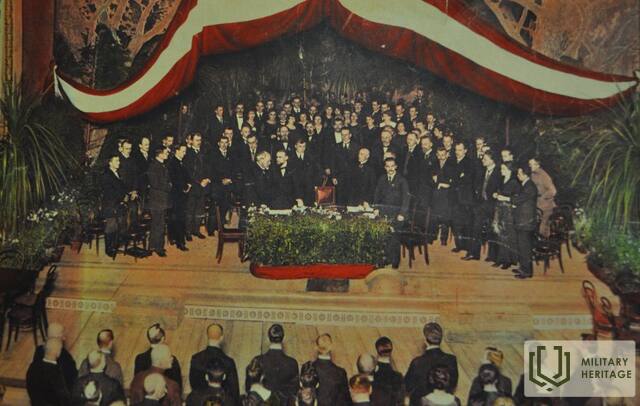Declaration of the Latvian state
I Wars of Independence
The end of the First World War on November 11, 1918 provided an opportunity for new nation-states to be born on the ruins of the collapsed empires of Germany, Russia and Austro-Hungary. One of them was the Republic of Latvia. On the afternoon of November 18, 1918, the establishment of an independent Latvian state was proclaimed at the modern Latvian National Theater.
The idea of Latvia's independence gained wider popularity in the second half of 1917, when the political and economic chaos in Russia encouraged the majority of the Latvian political spectrum to turn to the demand for independence. Despite various restrictions and repressions by the German and Bolshevik authorities, the two largest Latvian political organizations, the Democratic Bloc (DB) and the Latvian Provisional National Council (LPNP), continued to promote the idea of Latvia's independence in 1918.
The end of the war provided an opportunity to put the idea of independence into practice. However, the process of proclamation of the Republic of Latvia was not easy. The difficulties of merging DB and LPNP delayed the proclamation of Latvia's independence for a whole week. This was hampered by mutual intrigue and personal ambitions, as well as the different foreign policy orientations of the two organizations (DB focused more on Germany and LPNP on the Allies). The founding of the state required the unification of all political forces, and this was achieved on November 17, when the parties agreed to establish the Latvian People's Council (LTP). Consequently, DB and LPNP ceased their activities, and the members of these organizations continued to work for the LTP and the Provisional Government of Latvia. Jānis Čakste, a member of the LPNP, became the chairman of the Latvian People's Council, and Kārlis Ulmanis, an active representative of the DB, became the head of the Provisional Government. On November 17, the LTP also agreed on a common political platform, setting out the principles on which the new state should be founded.
It is decided to hold the solemn act of proclamation of the Republic of Latvia the next day at the modern Latvian National Theater, inviting 1,200 guests to the event. The theater was crowded long before the big event. The LTP formal sitting started at 4.30 pm. 38 LTP members took the stage to proclaim the Republic of Latvia. The solemn sitting was opened by the latest President of Latvia, Gustavs Zemgals. The joint political platform of the Latvian People's Council was read, several members of the LTP and the Chairman of the Provisional Government K. Ulmanis delivered speeches. There is a long round of applause and the anthem "God Bless Latvia" is sung three times. The proclamation session of the State of Latvia closed at 17.45.
The act of proclamation of the state is widely covered in the Latvian press. The people of Latvia are informed about the establishment of the state with a specially prepared printed invitation “for the citizens of Latvia”. Celebrations are held in many places in Riga and Latvia in honor of this event.
More information sources
1. 100 events in the history of Latvia. People and processes 1918-2018. JSC “Latvijas Mediji”, 2018.
2. Šiliņš, J. Publication of the series # LV99plus or Living History of lsm.lv “Who and why should you know about the proclamation of the Latvian state on November 18, 1918?”, 2020. Available at: https://www.lsm.lv/raksts/ life - style / history / what-and-why-know-about-latvian-state-proclamation-1918-year-18-november.a000000 / [viewed: 30.03.2021.]
Related timeline
Related stories
March 1917 - an important month in the history of Valmiera and Latvia
In March 1917, more than a year before the proclamation of the State of Latvia, the Vidzeme Provisional Land Council was founded in Valmiera, which adopted a resolution on Latvia's right to autonomy and self-determination. On the day of the founding of the Council, a red-white-red flag was raised at the meeting place for the first time.





